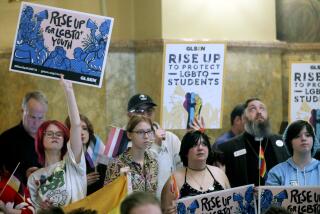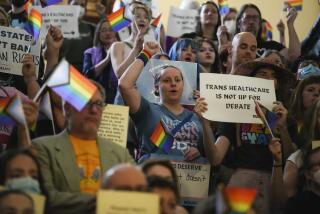Colorado’s Ban on Gay Rights Laws Is Voided
- Share via
DENVER — In a victory for gay-rights advocates, a Denver judge on Tuesday ruled unconstitutional a Colorado measure banning local laws that protect gays from discrimination.
State District Judge Jeffrey Bayless also made permanent his injunction blocking the law from taking effect, saying that Amendment 2 “violates the fundamental right of an identifiable group to participate in the political process.”
Bayless deliberated two months before returning his ruling following a trial that hinged on whether the popular vote may violate fundamental rights--and provided a national forum for debating the legal rights of gays in the 1990s.
During the October trial, dozens of expert witnesses gave opposing views on whether gays should have the same anti-discrimination protections as religious and racial minorities and whether homosexuality is chosen or based on genetic and environmental factors.
In his 17-page ruling Tuesday, Bayless said that evidence presented at the trial did not show the existence of “militant gay aggression in this state that endangers the state’s political functions,” as attorneys for Colorado had argued in trying to prove a compelling reason to uphold the amendment.
The judge noted that backers of the amendment insisted during the trial that “homosexuals are condemned by Scripture and therefore, discrimination based on that religious teaching is protected within freedom of religion.”
“On balance,” Bayless ruled, “this court concludes that the two rights, the religious right to discriminate and the homosexuals’ to participate in the political process, can coexist.”
But Bayless refused to rule that gays are a disadvantaged minority group who should receive special protection from the courts.
In the first of several hastily called Denver news conferences Tuesday, State Atty. Gen. Gale Norton said that she plans to appeal the ruling to the Colorado Supreme Court.
“It is absolutely clear,” Norton said, “that this case is one that needed to be decided by a higher court.”
Hailing the ruling as a victory, gay-rights groups called off a year-old national boycott of Colorado that cost the state as much as $120 million in lost convention and tourism revenues but had limited impact on the state’s multibillion-dollar tourism industry.
Sue Anderson of the Denver chapter of the National Gay and Lesbian Task Force said that the boycott had served its purpose.
“The boycott,” Anderson said, “successfully kept the issue in the media, caused a lot of discussion, and brought business leaders to the table who would otherwise not have been there.”
Amendment 2, which voters approved by a 53%-47% margin in November, 1992, was written and supported by a group called Colorado for Family Values with the aim of denying “protected-class status” to gays, according to the group’s founder, Will Perkins. He said that the group never intended to deny gays their civil rights.
The law would have prohibited Colorado and local governments from passing gay-rights laws and would have repealed ordinances in Denver, Boulder and Aspen.
Perkins said that he was not surprised by the ruling, beyond the fact that “Bayless waited until the end of the trial to make his decision.”
But Perkins lauded Bayless for not ruling that gays and bisexuals remain vulnerable or politically powerless and in need of extraordinary protections.
“We have said there is a militant gay agenda in this country, and one of their goals is to obtain protected rights status,” Perkins said. That, he added, “was the entire thrust of the plaintiffs in this trial, and the judge denied it.”
The law was supposed to take effect Jan. 15. But Bayless granted a preliminary injunction on behalf of opponents, pending the trial on the law’s constitutionality. In May, the Colorado Supreme Court upheld Bayless’ decision.
Suzanne B. Goldberg, an attorney for the Lambda Legal Defense and Education fund in New York, said that Bayless’ ruling “sends a national message that fundamental rights cannot be voted away by the general public based on bias or prejudice.”
Attorneys on both sides of the issue said that the case may eventually be appealed to the U.S. Supreme Court, raising the possibility of locking the amendment in legal limbo for years to come.
“I think this (Bayless’ ruling) gives us a very good basis for prevailing on appeal,” said Jean DuBofsky, lead attorney for the plaintiffs. “People ought to stop and think before they put issues like this on the ballot.”
Nationwide, voters last month banned gay rights protections in Cincinnati, repealed them in Lewiston, Me., and turned down such measures in Portsmouth N.H. As it stands, civil rights protection for gays exist in some form in eight states and 75 cities--including Los Angeles--and counties nationwide, according to the National Gay and Lesbian Task Force in Washington.
Colorado for Family Values provided more than $390,000 to help pass the Cincinnati law, supplying 79% of the money for the Ohio group promoting the law.
BACKGROUND
Colorado voters approved Amendment 2 last year, but the initiative never took effect because a judge issued a preliminary injunction in January, and that was upheld by higher courts. The initiative, which would have banned state and local laws prohibiting discrimination based on sexual orientation, provoked a nationwide boycott of the state’s tourism industry.
More to Read
Sign up for Essential California
The most important California stories and recommendations in your inbox every morning.
You may occasionally receive promotional content from the Los Angeles Times.














